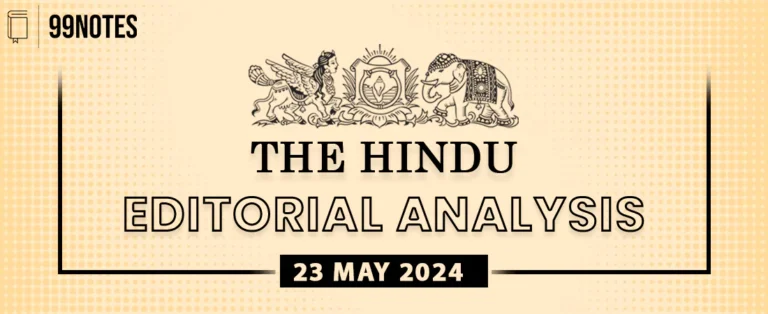4 March 2024 : The Hindu Editorial Notes PDF
The Hindu Editorial
4-March-2024
1. Mountains of plastic are choking the Himalayan States
| Topic: GS3 – Environment – Environmental pollution and degradation Critical for UPSC as it delves into environmental challenges, regulatory gaps, and regional impacts, assessing candidates’ understanding of complex environmental issues. |
| Context |
|
Introduction:
- Ubiquitous Presence: Plastic pollution is widespread, found from the highest mountain to the deepest ocean trenches and even inside human organs like lungs and placenta.
- Microplastics Formation: Improper disposal leads to the degradation and fragmentation of large plastic pieces, forming microplastics.
Regional Impact:
- Himalayan Region: Microplastic deposition found in mountains, rivers, lakes, and streams, affecting major rivers like the Indus, Ganges, and Brahmaputra.
- Glacial Trapping: Microplastics can remain trapped in glaciers, releasing into rivers during snow melting.
- Biodiversity Impact: Unscientific plastic disposal causes soil and water pollution, adversely impacting biodiversity and freshwater sources.
Causes:
- Urbanization and Changing Consumption Patterns: Rapid and unplanned urbanization, coupled with changing production and consumption patterns, contribute to the plastic waste crisis.
- Tourism Impact: Increasing tourist footfalls exacerbate the plastic pollution problem in the region.
Current Situation and Initiatives:
- National Green Tribunal Action: Notices issued on waste dumping in eco-sensitive areas in Himachal Pradesh.
- Local Initiatives: States like Himachal Pradesh, Sikkim, and Mizoram have enacted laws and initiatives to curb plastic use.
- Environmental Impact: Reports highlight plastic waste in sensitive areas, such as Ramsar sites and rivers like Nambul in Manipur.
Plastic Overshoot Day and Recycling Discrepancy:
- Plastic Overshoot Day: India reached its plastic overshoot day on January 6, 2023, indicating a gap in waste management capacities.
- Mismanaged Waste Index: India has one of the highest mismanaged waste indices globally, indicating a significant gap between waste management capacity and plastic consumption.
- Recycling Discrepancy: Discrepancy in recycling claims; statistical analysis shows only 12% of plastic waste is recycled, with 20% being incinerated.
Legal Framework and Challenges:
- Regulatory Framework: Solid Waste Management Rules (SWM) 2016, Plastic Waste Management (PWM) Rules 2016, and Extended Producer Responsibility (EPR) 2022 form the regulatory framework.
- Hill-Specific Needs: Hill areas’ special needs not adequately recognized in the regulatory framework, affecting waste management efforts.
Local Bodies and Waste Management:
- Role of Local Bodies: Local bodies responsible for waste management from collection to disposal.
- Devolution Challenges: Limited devolution of power to local bodies; few have enacted model by-laws to operationalize waste management mandates.
Recommendations and Way Forward:
- Resource Allocation: Considerate resource allocation considering the unique ecological sensitivity of the Himalayan Region.
- Empowering Local Bodies: Empower local bodies, include traditional institutions, and create necessary infrastructure for effective waste management.
- Public Education: Sustained public education campaigns for waste segregation and management.
- Geographical Consideration in EPR: Consider higher operational costs for EPR in mountainous regions, reflecting in the value of EPR certificates.
Data Gaps and Convergence:
- Data Plugging: Address data gaps related to waste generation and quality in the Indian Himalayan Region.
- Convergence of Schemes: Utilize existing schemes like SBM, MG-NREGA, and Finance Commission grants for creating infrastructure.
- Philanthropic Contributions: Leverage the Swachh Bharat Kosh Trust to channelize philanthropic contributions for waste management.
Conclusion:
- Integrated Approach: The Himalayan plastic crisis demands an integrated approach involving regulatory, infrastructural, and behavioural changes to mitigate the environmental impact and protect the region’s biodiversity and water sources.
| PYQ: What are the impediments in disposing the huge quantities of discarded solid wastes which are continuously being generated? How do we remove safely the toxic wastes that have been accumulating in our habitable environment? (150 words/10m) (UPSC CSE (M) GS-3 2018) |
| Practice Question: Examine the environmental and regulatory dimensions of the plastic pollution crisis in the Indian Himalayan Region, proposing effective strategies for sustainable waste management. (150 words/10 m) |
2. The long road to reforming India’s political party system
| Topic: GS2 – Indian Polity – State legislatures – Conduct of Business and issues arising out of these Significant for UPSC as it delves into political defections, anti-defection law interpretation, and the need for inner-party democracy. |
| Context |
|
Introduction:
- Upcoming 2024 general elections witness a surge in political defections across India.
- Instances of MLAs switching from Congress and RJD to BJP in Bihar, and cross-voting in Himachal Pradesh, leading to disqualifications.
Maharashtra Legislative Assembly Speaker’s Verdict:
- On February 15, 2024, in Maharashtra state assembly speaker gave a decision on the split within the Nationalist Congress Party (NCP).
- No disqualification; Ajit Pawar faction recognized as the “real” NCP.
- Similar to earlier decisions in the Shiv Sena split where neither faction was disqualified.
Observations on Anti-Defection Law:
- Speaker’s reliance on legislative majority to determine the real party.
- Terming the NCP split as “intra-party dissent,” suggesting it falls outside punitive provisions of the Tenth Schedule.
- Speaker contends that such dissent cannot be subject to anti-defection law, allowing dissenting MLAs to remain in the Assembly.
Legal Concerns and Transgressions:
- Questionable soundness of the observation on intra-party dissent; suggests dissenting groups should ideally merge with another party for Tenth Schedule protection.
- Anti-defection law’s current exemption only applies for mergers, requiring a two-thirds majority for separation and merging with another party.
- Splitting factions in Shiv Sena and NCP claimed to be the original party, forming alternate governments without merging.
Speaker’s Worrying Observation:
- Speaker’s statement on the nature of politics, alliances, and forging new relations, suggesting political movements don’t qualify as defections.
- Raises questions on the efficacy and purpose of the anti-defection law if manifest transgressions are allowed.
Inner-Party Democracy Concerns:
- Need for better reform of the political party system, emphasizing inner-party democracy.
- Defections often linked to the absence of inner-party democracy, prompting the call for comprehensive party structure studies.
- Law Commission’s recommendations for amendments to the Representation of the People Act, 1951, proposing statutory regulations for inner-party democracy.
Way Forward:
- Urgent need for thorough study and reform of political party structures to ensure inner-party democracy.
- Law Commission’s proposals, including elected executive committees and regular party-level elections, yet to be implemented.
- Speaker presiding over a committee to review the anti-defection law, offering an opportunity for India to tailor the law to its needs.
Conclusion:
- Hence it is important to address the challenges and legal nuances surrounding political defections, urging a re-evaluation of the anti-defection law and a focus on inner-party democracy for effective reforms.
| Anti-Defection Law in India |
Shortcomings of Anti-Defection Law in India:
Way Forward:
By addressing these shortcomings, the Anti-Defection Law can be strengthened to uphold the principles of democracy and political integrity in India. |
| PYQ: With reference to anti-defection law in India, consider the following statements: (2022) 1. The law specifies that a nominated legislator cannot join any political party within six months of being appointed to the House. 2. The law does not provide any time-frame within which the presiding officer has to decide a defection case. Which of the statements given above is/are correct? A. 1 only B. 2 only C. Both 1 and 2 D. Neither 1 nor 2 Correct Answer: Option (B) 2 only |
| Practice Question: Examine the challenges posed by recent political defections in India, evaluating the interpretation of anti-defection laws and the imperative for enhancing inner-party democracy. Discuss potential reforms. (150 words/10 m) |
For Enquiry

4 March 2024 : The Hindu Editorial Notes PDF

4 March 2024 : PIB Summary for UPSC

4 March 2024 : Indian Express Editorial Analysis

2 Mar 2024 : Daily Current Affairs Quiz

2 Mar 2024 : Daily Answer Writing

2 March 2024 : Daily Current Affairs

2 March 2024 : The Hindu Editorial Notes PDF

2 March 2024 : PIB Summary for UPSC

2 March 2024 : Indian Express Editorial Analysis

1 Mar 2024 : Daily Current Affairs Quiz
March – The Hindu Editorial 4 March 2024 : The Hindu Editorial Notes PDF The Hindu Editorial
4-March-2024
1. Mountains of plastic are choking the Himalayan States
Topic:…
March 2024 PIB 4 March 2024 : PIB Summary for UPSC PIB Summary for UPSC
4-March -2024
1. The Union Ministry of Home Affairs releases three videos about…
Indian Express 4 March 2024 : Indian Express Editorial Analysis Indian Express Editorial Analysis
4-March-2024
1. A fair deal for farmers
Topic: GS2 – Governance…
Daily Quiz 2 Mar 2024 : Daily Current Affairs Quiz 2 Mar 2024 : Daily Quiz…
mains answer writing 2 Mar 2024 : Daily Answer Writing Mains Answer Writing
2-March-2024
Q1) Is the National Commission for Protection of Child Rights (NCPCR)…
Daily Current Affairs 2 March 2024 : Daily Current Affairs Daily Current Affairs
2-March -2024- Top News of the Day
1. Supreme Court Ruling Upholds Judicial Discretion…
March – The Hindu Editorial 2 March 2024 : The Hindu Editorial Notes PDF The Hindu Editorial
2-March-2024
1. Change and continuity in India’s Palestine policy
Topic: GS2…
PIB 2 March 2024 : PIB Summary for UPSC PIB Summary for UPSC
2-March -2024
1. INDIA – MALAYSIA BILATERAL MARITIME EXERCISE SAMUDRA LAKSAMANA
Topic:…
Indian Express 2 March 2024 : Indian Express Editorial Analysis Indian Express Editorial Analysis
2-March-2024
1. Blue water power
Topic: GS2 – International Relations…
Daily Quiz 1 Mar 2024 : Daily Current Affairs Quiz 1 Mar 2024 : Daily Quiz…


